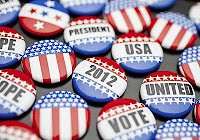Inaugurating Elections
Last month as I drove from Los Angeles to Minneapolis I spent several hours crossing through Iowa. It was days before the Caucuses and the national media had parked themselves throughout the state. Several of the candidates had been active in the state for years. I was tempted to pull into Des Moines and sit at a diner and claim to be an undecided farmer just to see the circus reaction…but I’m more comfortable in the role of blogger than agitpropist... though some may say they’re not all that different!
Inauguration Day is just about a year away – Sunday, January 20, 2013. In the next year political prognosticating will consume Cable TV, newspapers, magazines and terabits of data on the Net. Candidates from dog catcher to President will make this the most expensive electoral season ever, with predictions that the race for the White House alone exceeding a billion dollars. The end result will look a lot like what exists today: a deeply and sharply divided country.
In 2010 the voting eligible population in the U.S. was 41.6%. Nearly every Presidential election over the country’s history has had the popular vote pretty evenly split between the major parties so elections are won by as little as 21% of the voting pool. When compared to the entire population – which is nearly 2.5 times the voting population – the percent needed to win goes down to just 8.75%. That’s how a minority make decisions that impact the majority.
Voter apathy, election funding schemes and a continuous news cycle all contribute to the problem. Electing a U.S. President is comparable to launching a new brand via a reality show. Is there a better way?
Every four years there is much hand-wringing about whether Iowa and New Hampshire “should” be first in the nation. From each state’s perspective there is much pride taken in their role and the individuals take the process seriously and put the candidates through months and years of rigorous one-on-one questioning.
Rotating the “first in the nation” to other states may not result in that populace taking the same rigor to the candidates that Iowa and New Hampshire do. A California first-in-the-nation contest would yield a very different campaign and candidate since it is the most populous state and also one of the most diverse. New Hampshire is #43 and Iowa #31.
Like it or not today the Presidential race is all about media and branding. The policy result is problematic with highly complicated and nuanced issues being ignored or simplified to sound bites. This trend won’t change. Recognizing that the selection of a party’s nominee isn’t about retail politics allows for some different approaches.
Primaries should be held regionally – the East Coast on one Tuesday, the South on the next, the Midwest the following and the West the next. Let New Hampshire go first on a Monday and the rest of the East the next day on a Tuesday to keep the narrative and historic value of being first in the nation in place. Regions would have much more of an impact – and a “winner” wouldn’t be necessarily clear until every part of the country could weigh in.
Limit the primaries to six months before Election Day – so no balloting before May of the Election Year. That won’t stop the prediction derby of the political class, but it will narrow the attention spans of the electorate and might increase participation.
Financing: people who can vote for a candidate are the only one’s who can fund them. Corporations, unions, PACs can’t vote so they couldn’t give money. Out of district people can’t fund a candidate…only in district people can. Fully disclose donors within 24 hours on the Internet.
The political power brokers would never allow these easy to implement proposals to kick in. Maybe we need an agitpropist to push ‘em?




Comments
Post a Comment